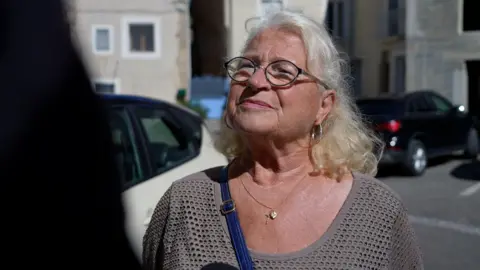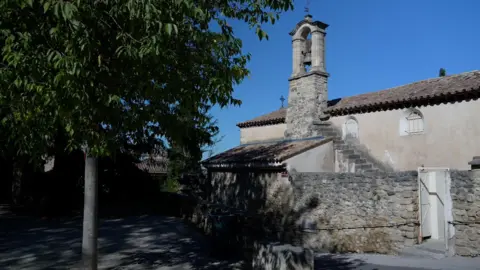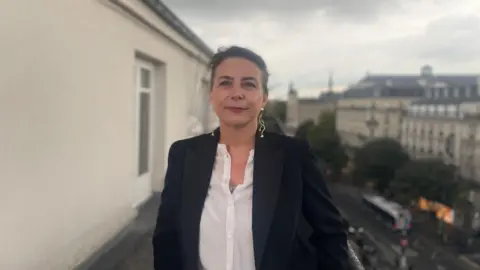
France’s mass rape victim, Gisèle Pelicot, is returning to court on Monday to face one of her attackers, the only man who is appealing against last year’s trial verdict in which a total of 51 accused were convicted of raping her as she lay, drugged by her husband, in their family home.
At the time, Madame Pelicot’s defiant public stance was seen as a potentially catalytic moment in the fight against sexual violence. But in France, that optimism appears to be wilting.
“I’ll smash your head in if you don’t leave now,” snarled a man standing outside a medieval church in Mazan, the picturesque town where Gisele and Dominique Pelicot once lived.
He’d just overheard me asking an elderly woman about the impact of the Pelicot case on France and, while threatening to destroy our camera too, was now explaining that the town was tired of being linked to one of the world’s most notorious rape trials.

A few days earlier, the mayor of Mazan had issued a gentler version of the same argument, in a public statement that described Gisèle Pelicot’s years-long ordeal as “a private matter… that has nothing to do with us”.
One can well understand Mayor Louis Bonnet’s desire to protect his town’s reputation and its tourism industry. But it seems worth noting that a year earlier, he’d made headlines across France after he’d told me, twice, in an interview, that he wanted to “play down” the seriousness of Gisèle Pelicot’s ordeals because “no-one was killed”, and no children were involved.
It is also worth noting that almost all the women we did speak to in Mazan last week did not share the mayor’s desire to see the Pelicot case as, primarily, something to “move beyond”.
Smoking a cigarette in a shaded doorway not far from the church, a 33-year-old civil servant, who gave her name as Aurélie, spoke with undisguised bitterness.
“No-one talks about it anymore, even here in Mazan. It’s as if it never happened. I know someone experiencing domestic violence right now. But women hide it. They’re afraid of the men who do these things,” she said, adding that she was “certain” that more of Gisèle Pelicot’s rapists remained undetected, and at large, in the neighbourhood.
Walking nearby past a couple of sunbathing cats, Aurore Baralier, 68, was equally keen to talk, but took a different view of the Pelicot case.
“The world is evolving. France is evolving.” With Madame Pelicot’s help? “Yes. It’s been a boost, for women to speak freely,” she told me, emphatically.
Across France, there is no doubt that the publicity generated by Gisèle Pelicot’s globally broadcast determination that “shame should change sides” – from victim to rapist – has provided added momentum to a campaign against sexual violence already energised by the MeToo movement.
“I would say changing behaviour is something that takes generations. [But] the Pelicot case sparked a huge, historic mobilisation… against sexual violence, and against impunity,” said Alyssa Ahrabare, who co-ordinates a network of 50 feminist organisations in France. “We’re focused on training professionals, supporting victims, on investigations.”
“Yes, France has changed. The [number of] complaints of rapes has tripled, showing that victims – women and girls – they speak up and they want justice,” agreed Céline Piques, spokesperson for the NGO “Dare to be feminist”.
And yet, the energy and optimism that engulfed Gisèle Pelicot last December, as she emerged from the Avignon courthouse and into a scrum of supporters, have not led to many substantive changes to the way the French state tackles the issue of sexual violence.

Indeed, there is a near consensus among campaigners and experts that things are, instead, deteriorating.
“Unfortunately, the government does not react,” said Céline Piques, pointing to statistics showing that conviction rates are flat-lining despite a sharp rise in reported rape cases.
“The picture is bleak. There is a backlash. Rape culture ideas are coming back very strongly. We can see this with the masculinist movement rising in popularity, especially with young boys and teenagers,” added Alyssa Ahrabare, also citing the rise of deep-fake pornography.
In the midst of a financial and political crisis in France, with public debt soaring, and the country having five prime ministers in the past two years, the government has strongly defended its record, saying it has made “decisive” changes, including trebling spending in this field in the past five years – an “unprecedented” increase.
However, a scathing Senate report this summer concluded that the government was “lacking a strategic compass”, when it came to tackling rape and other forms of sexual violence. The Council of Europe has also been highly critical, recently, of France’s efforts to protect women.
A well-placed source told us that even data about the number of rapes reported in France were unreliable due to an overly complex bureaucracy.
Occasionally, a news story will offer another small jolt of optimism.
In Dijon, a 60-year-old accused of drugging his wife for others to rape her, was arrested in August after one man, invited to participate, later called the police, having doubted “her consent”.
The alleged victim’s lawyer, Marie-Christine Klepping, told us she was “sure” that knowledge of the Pelicot case, and fear of being caught up in something similar, had prompted that phone call.
In May, the French film star Gérard Depardieu was found guilty of sexually assaulting two women in what many lawyers and activists hailed as a significant blow against a widely perceived culture of impunity enabling powerful men to abuse women.
“It could mean something,” Elodie Tuaillon-Hibon told the BBC, “because he has been very protected, [even] by President Macron”, who appeared to defend the actor at one point. Ms Tuaillon-Hibon is a Paris-based lawyer who had previously been involved in prosecuting Depardieu.

“I don’t think the (Pelicot) trial has changed anything at the police and judicial levels,” said Emmanuelle Rivier, a lawyer also specialising in rape cases. She cited chronic understaffing, along with a lack of police training and specialisation.
And now Gisèle Pelicot herself is returning to court in the southern city of Nîmes to face one of the men convicted of raping her.
“She feels she needs to be there and has a responsibility to be there until the procedure is completely over,” her lawyer, Stéphane Babonneau, explained to me.
The true impact of her decision to waive her right to anonymity may not be clear for many years, but the lawyer Elodie Tuaillon-Hibon is not inclined to be optimistic.
“It changed some things. But actually very little,” she concluded, comparing sexual violence in France to a “war waged against women and children every day”.
“We still have a great deal of changes to (make).”
I asked her if she was surprised the Pelicot case had not had a deeper impact.
“No. Not surprised at all because, well, it’s France. Rape culture is something deeply rooted in our society. And until it’s taken into consideration seriously as a matter of public policy, it won’t change.”



